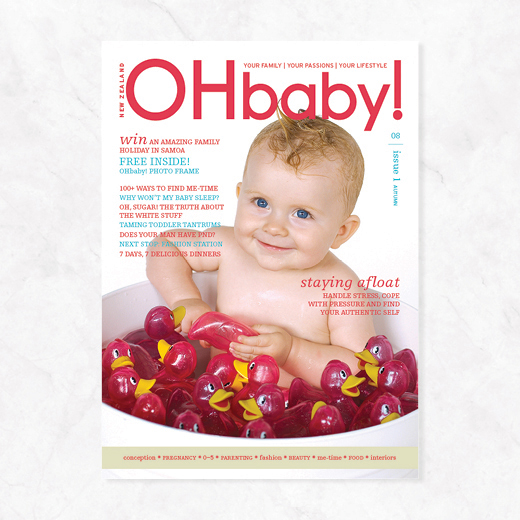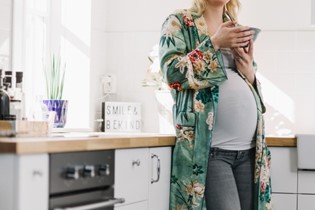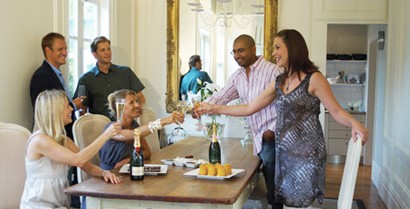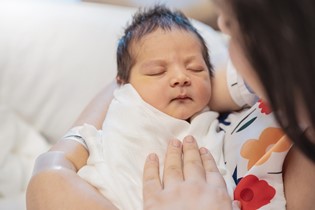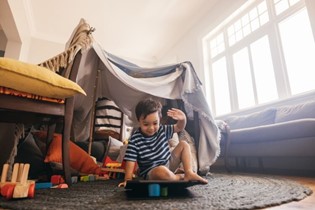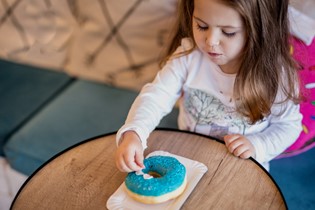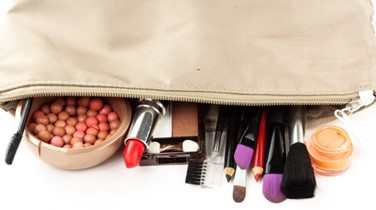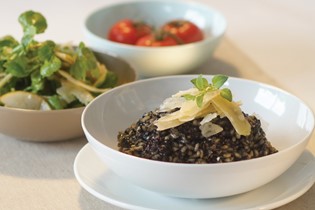A personal and powerful account of loss and hope
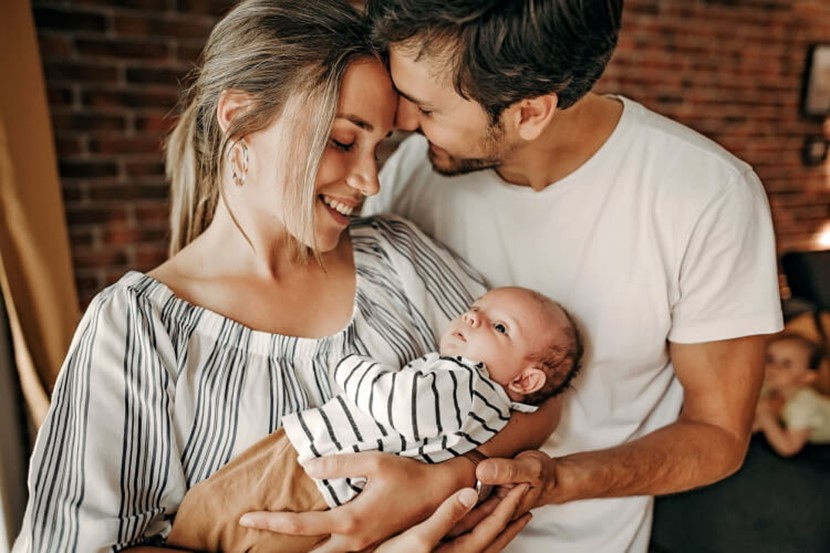
Robyn and Jonathan Dove experienced six painful years of infertility before conceiving their son, Toby - only to tragically lose him at 29 weeks gestation. But they didn't give up hope, and eventually they welcomed their miracle baby Arwen. Here, Robyn and Jonathan share the powerful story of their two children and their journey through infertility.
Robyn's story
I wasn't naïve going into the whole "having a baby" journey: My sister had lost her first baby, Sean, when he was two days old, so I was acutely aware that things can, and sometimes do, go awfully wrong. All the same, I was hopeful that Jonathan and I would conceive within a short time and soon have our own wee baby in our arms.
We started trying a few years into our marriage. At the time, Jonathan was studying in Australia, so we had to work around that. Things started to take longer than we had anticipated, but we had to wait until we came back to New Zealand 18 months later to begin any sort of testing to look for potential problems. When we did return, all our tests came back as normal, so when Jonathan received a scholarship to study in the US, we thought it would be okay to keep trying for a baby on our own.
When we still weren't pregnant after two years in the US, we went to see a specialist. He advised us that the next step would be an exploratory laparoscopy, which would cost around US$10,000 (NZ$12,500). We decided to keep trying on our own until we could have the surgery done back in New Zealand.
By the time we returned here and booked in to have the surgery, we had been trying to get pregnant for almost six years. I was definitely starting to get to the point where I thought it was never going to happen. I always had hope, but the trying and trying beat me down and left me without emotional reserves.
The laparoscopy results came back as normal, as were all of our other repeated tests, so we were referred to Fertility Plus for preliminary fertility treatment. For us, that consisted of me taking Clomiphene, a drug which helps regulate ovulation, and having an IUI (intra-uterine insemination) done.
When we found out that the treatment had worked and that I was pregnant, I was joyful for a nanosecond, then pushed it deep down inside. I felt numb. I couldn't tell anyone and Jonathan was sworn to silence. I had been beaten down too far by the prolonged wait to be able to allow what was happening to us to really sink in.
In fact, the first person I told about my pregnancy was a salesperson in a lingerie shop. I went in looking for a bra that would be more comfortable for my changing figure.
I felt flushed as I mumbled to the assistant that I was pregnant. She replied nonchalantly, "So, when's the baby due?"
My head felt like it was stuffed with cotton wool as her innocent words created an almost audible hum inside my brain.
At first, I couldn't even understand her words - could it possibly be true that I was having a baby? Could I really be like everybody else? The trauma of the long wait had left an indelible mark.
As much as we knew about getting pregnant, we knew almost nothing about what to do next. When we had left New Zealand, GPs still took care of pregnant women. I had never even heard of an independent midwife, and, since I felt that I couldn't speak to any of my friends about our pregnancy, it took a while to find a lead maternity carer. Finally we were accepted by the community midwives at Waitakere Hospital.
An early scan showed that the pregnancy had originally been twins, which is common with Clomiphene-assisted pregnancies, but, sadly, one had died a few days prior to the scan. The second baby looked completely healthy. Nonetheless, we were anxious about the upcoming 20-week anatomy scan.
Jonathan was out of town for work the day of the anatomy scan, which, in hindsight, was extremely foolish. Still, we were new at this and had no real idea what we were doing. I lay alone on the scanning table, desperately hoping to hear what every mum-to-be wants to hear: "Your baby is fine."
But our baby wasn't fine. The trainee sonographer looked worried. She asked me if we'd had the 13-week nuchal scan or an amniocentesis. I quashed my rising sense of dread and fought hard to hold it together while the sonographer's supervisor came in, and also looked concerned as she stared at the scan. She repeated the same question: "Had we had the nuchal scan or an amniocentesis?"
I was later rescanned and met with an obstetrician, who mentioned the possibility that our baby might have trisomy 13.
Against Jonathan's advice, I looked up trisomy 13 on the internet, learning that it is a particularly cruel chromosomal abnormality. Jonathan and I prayed our baby didn't have it, and we waited anxiously for the results of the amniocentesis.
It turned out that it wasn't trisomy 13; in time, my symptoms revealed I had a particularly aggressive form of pre-eclampsia, with symptoms of HELLP syndrome (Hemolysis, Elevated Liver enzymes and Low Platelet count). I was admitted to hospital at 26 weeks with the aim of growing our wee baby to a viable weight so he could be delivered.
But it soon became obvious that our baby was never going to reach a viable weight. I was dangerously ill and the placenta simply couldn't function well enough for him to grow. We had to let him go.
In August 2005, our son, Toby, was "born sleeping" at 29 weeks gestation, weighing less than 400g. We were devastated. More than six years of expectations, hopes, plans, and wishes were shattered.
A few months after Toby died, we had to face the inevitable question: Where to from here?
Eventually we were approved by CYF as potential adoptive parents, which we were excited about. We also decided to try again to conceive. Because of the severity of my earlier pre-eclampsia, I was at a much higher risk of contracting it again in a subsequent pregnancy. If we used Clomiphene again and subsequently conceived twins, the risks increased even more.
We saw Professor Lesley McCowan, one of the top specialists in pre-eclampsia, who had also been involved in my care during my pregnancy with Toby, and decided on an action plan.
We commenced the Clomiphene/IUI treatment again with Fertility Plus, this time using the lowest dose of Clomiphene possible to reduce the risk of conceiving twins. While the first cycle wasn't successful, we conceived on our second attempt.
Under Professor McCowan's supervision, I took low-dose aspirin, a high dose of calcium and a multivitamin, and injected myself every day with Clexane, a drug to help stop blood clots forming in the placenta. That was hard - my stomach became bruised, and the injections hurt, but the worst thing was that I still couldn't equate being pregnant with bringing home a baby. I was so beaten down from the years of infertility and from losing Toby. I felt totally helpless.
Throughout the difficulty of my pregnancy and the medications and injections, we decided to do one thing to try and bring some sense of normality to our lives: We enrolled in antenatal classes. It was hard to do, as we felt so different. And, unlike the other expectant mothers in the class, I already had a birth story, having given birth to Toby.
I decided not to tell our story to the other couples in the class. Infertility had forged a protective shell of silence over me. Plus, it was the one place where we could be just be a normal couple expecting a baby. Later, after our babies were born, our antenatal class formed a coffee group. But, to this day, we have never told them about Toby or our struggles to have a child.
Despite my high risk of again developing complications, maybe by chance, maybe by prayer or maybe because of the Clexane and other treatments we underwent, at 36 weeks I was given the all-clear - our baby was perfectly healthy. Arwen was born at term weighing a healthy 3.5kg (71/2 lbs).
Arwen is now 13 months old, and to say that we have cherished every moment of her life is an understatement. People sometimes say to me that it's my fault she is a high-maintenance baby, that I pick her up and cuddle her too often. But, as far as I'm concerned, there is no such thing as "too often". We don't get the chance to cuddle Toby and hold him, but Arwen is here and I don't want to miss a single opportunity to let her know how loved, and how very much wanted, she is.
Looking back over our journey, I do have regrets. I regret never joining an infertility support group. Infertility is such a taboo subject and it would have been healthy for me to have been able to discuss it with others who understood. As anyone who has had difficulty conceiving knows, you do get sick of well-meaning people who have never experienced the pain of infertility offering you their two cents' worth of advice on why you can't conceive, and how you should just "relax and it will happen". We've learned life's not like that. You're not always in charge of what happens; infertility is one of those things you can't control.
I guess I had always looked at life as a story and having children was an assumed part of that story. Infertility made me feel my life was without shape or a plot line. I didn't know how to come up with a new story line, and I could never quite accept that I would have to.
Those years were a continual swing from despair to hope and back again. It was like living in limbo, and it was hard not to live as if my life was on hold. I even turned down job offers "just in case" we got pregnant. I simply couldn't let that hope die.
One thing I do not regret is that I allowed myself to start collecting things that I dreamed of one day giving to my future children. I allowed myself hope.
Personally, I have found that having a child hasn't instantly healed me from the pain of infertility; the wounds are still raw. Having Arwen has, however, been a release from the intensity of this darkness.
There's a quote in one of CS Lewis' books that, for me, reflects our journey: "Life is about anticipating something, experiencing something, and then remembering it fondly." For so many years, we looked forward to having children. We have been blessed with the experience of having both Toby and Arwen, and, in years to come, I know we will look back with fullness and remember this time, to quote Lewis again, as the "days of love".
Jonathan's story
I'll never forget the one time I sat in a playground next to a football field, watching other people's children play. It seemed like the most normal thing in the world, yet I was overwhelmed by this sense of missing out. Of missing out on being able to push my child on the swing, of missing out on being able to watch my son play school football with his friends.
Later, after we had lost Toby, I found myself back in that same playground with those same familiar feelings. Only this time, it hurt so much more. We'd had a taste of parenting, of what it means to have a child, only to have him taken away. We'd learned what it was to love a child, yet experienced the devastating loss not to be able to raise that child. We just didn't seem to fit into the way everything is meant to be.
My grief started a lot later than Robyn's, which must have been incredibly frustrating for her. In the early days of trying to get pregnant, I saw her starting to get down each month when things didn't happen, but I was optimistic that something would eventuate. In the past, I had been around friends who simply took a few more months than expected. Surely, it would be the same for us.
As months turned into years, my optimism gave way to pessimism, and I finally embraced the realisation that we did have a problem conceiving.
I don't know how Robyn could remain as patient as she was. Not only did she have to wait for me to come around to the idea of fertility treatment, she had to wait for us to return to New Zealand to begin the first steps (with the knowledge that it was my study commitments that had called us overseas in the first place).
Getting to a stage where we were both ready and able to begin fertility treatment was one thing. Beginning the treatment was another. The system isn't really geared up well to deal with couples as a unit. Though Robyn and I were in this together, the staff always addressed Robyn. It was "Robyn's folder" of results and notes rather than "our folder". I felt like I was just a nameless sperm donor. Perhaps it was payback time for the long delay in me getting to this place.
Then there was the pressure to perform. It should be such a simple thing. After all, my wife was undergoing all this intense treatment and all I had to do was provide a specimen in a jar - imagine if I couldn't even get that right! Yet, the pressure to deliver can feel pretty intense. I still remember arriving with "the jar" and walking through the reception area to hand it in.
I certainly felt as if all eyes were upon me. Everyone just knows what you're doing. Embarking on this journey certainly meant leaving our dignity at the door.
The hardest part was seeing the impact it had on Robyn. The journey had already been way too long and hard, but it wasn't over. Due to the earlier loss of our son, I had to watch Robyn go through the daily Clexane injections for months on end. Her stomach was all bruised. It was obviously painful for her, and it did make me start to question whether this was all worth it. I certainly had it light in comparison.
Then there were the regular scans and appointments. Each one caused us to hold our breath until we heard a heartbeat and saw calmness on the faces of the radiographer or doctor. In between appointments, our anxiety at times got the better of us and we just needed to hear our baby's heartbeat and ensure that everything was okay. The staff in the Women's Assessment Unit (WAU) at the hospital were incredibly supportive.
Over a year later, I found myself back in the park with the playground. Only, this time, I have my beautiful daughter to push in the swing and hear her laugh.
The pain of losing our firstborn son is still there, as is the memory of the years it took to get here. But I'm so pleased we persevered. Pushing Arwen on the swings is a pretty awesome experience!
by Emma Fahy

AS FEATURED IN ISSUE 1 OF OHbaby! MAGAZINE. CHECK OUT OTHER ARTICLES IN THIS ISSUE BELOW
